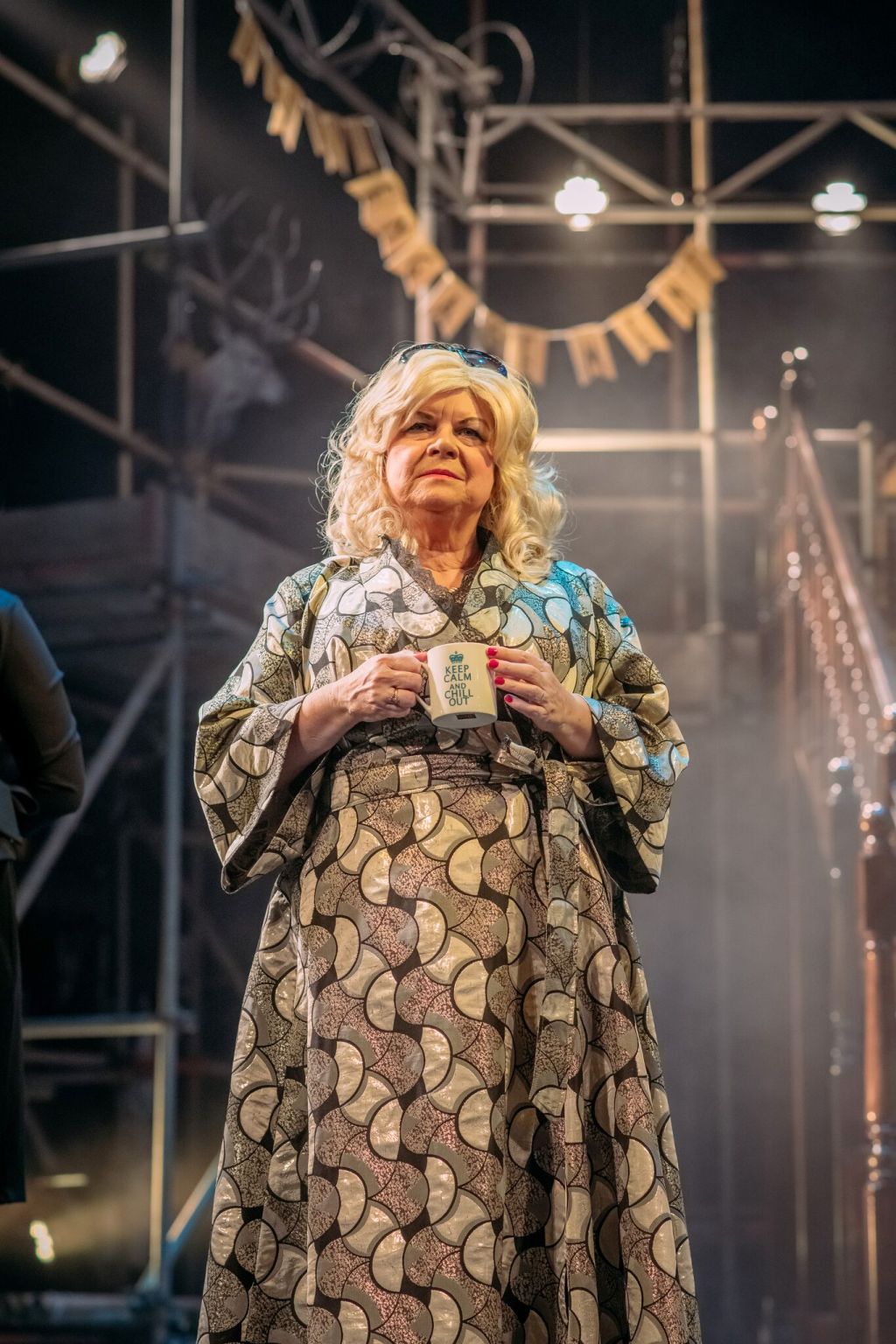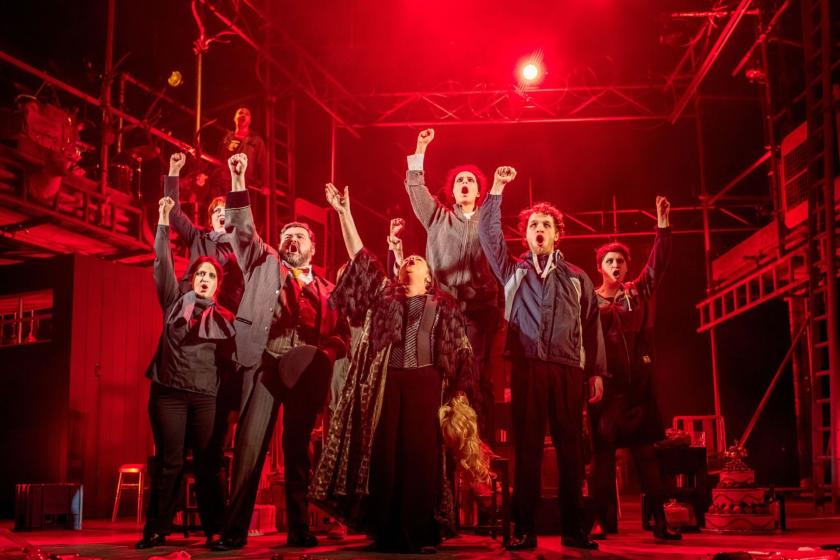If there’s one certainty about the Edinburgh Lyceum’s production of Mrs Puntila And Her Man Matti – and there aren't many in this unsatisfying, overlong revival – it’s that Elaine C Smith makes a terrific drunkard. The Scottish sitcom star, musical veteran and pantomime stalwart plays the erratic millionaire Mrs Puntila in Denise Mina’s re-gendered and relocated take on Brecht's 1948 original, hiring and firing staff with abandon as she totters and teeters, slurs and stumbles around the stage, sinking tumbler after tumbler of whisky. It’s an OTT, unsubtle performance, certainly, but her alcohol-fuelled energy (in character, 'natch!) proves the saving grace of an otherwise ill-defined show.
Smith’s Puntila (pictured below) is a woman of two halves, a Glaswegian Dr Jekyll and Mr Hyde. When she’s pissed, which is most of the time, she’s a hoot, chummily carousing with her staff, offering out jobs willy-nilly, and promising her daughter Eva’s hand in marriage to her long-suffering chauffeur Matti, played with world-weary brusqueness by Steven McNicoll. When’s she’s sober, which is hardly ever, she’s the opposite – cruel, avaricious, enterprising, and determined to secure her social status by wedding Eva to a vacuous Viscount. The world dances to her whims, and its only Matti, picking up the pieces, that can make her out for what she is.
 Brecht wrote Mr Puntila while in exile in Finland during the Second World War, and it was the opening production of the opening season of his Berliner Ensemble upon his return to Germany. Much of what we have come to consider classic Brecht is there – songs, split characters, and socialism – and his message is clear: philanthropic fancies are no match for genuine equality. It is, one might think, a tale ripe for major revival in our world of zero-hours contracts, payday loans and precarious labour.
Brecht wrote Mr Puntila while in exile in Finland during the Second World War, and it was the opening production of the opening season of his Berliner Ensemble upon his return to Germany. Much of what we have come to consider classic Brecht is there – songs, split characters, and socialism – and his message is clear: philanthropic fancies are no match for genuine equality. It is, one might think, a tale ripe for major revival in our world of zero-hours contracts, payday loans and precarious labour.
Perhaps so, but the problem with Mina’s adaptation, which swaps Scotland for Finland and Mrs for Mr, is that it doesn’t fully commit to capturing the contemporary resonances of the story. Mina stuffs in a few geographical jokes, but it’s never clear where we are, when we are, or who the inconstant, verbally-incontinent Puntila is meant to be lampooning. She’s not a tweed-jacketed landowner, but she’s far from a cut-throat capitalist as well. Her world isn’t Brecht’s Europe, nor is it modern-day Scotland. It’s an awkward hybrid of the two, too faithful to the former, too far from the latter, and it leaves the audience nowhere.
Murat Daltaban’s production doesn’t help: Brechtian to its core – the seams and stitches are there for all to see – but never very funny. Tom Piper’s set shows an enormous scaffold, onto which backdrops and drapes are unceremoniously hung. Props are very obviously props, and actors very obviously actors. The fourth wall gets razed about thirty seconds in. “There’s a costume change going on, I won’t lie to you,” explains McNicoll’s Matti, during a long delay in which he simply sits reading the paper. “And we thought honesty was the best policy.”
All of which could – should – be amusing, but the laughs are few and far between, particularly in the first half. Brecht’s play is almost an absurdist farce, with Puntila changing her mind at the drop of a hat, and Matti scampering around to put out the fires she causes, but Daltaban’s staging – a few imaginative touches aside – struggles to capture that chaos. It’s slow and stilted, and scenes are split up by a hotch-potch of genre-hopping songs by Oguz Kaplangi that emphasise the episodic nature of Brecht’s plot.
The satire doesn’t sting and the politics don’t really pack a punch either, despite some laboured attempts at agit-prop towards the end. The hard-working cast are left floundering. Some sink – Joanne McGuinness’ shrill Eva is markedly misjudged, as is Richard Conlon’s simpering Viscount – and some swim: McNicoll makes the most of his gruff, galumphing charm as Matti. And at the centre of it all, Smith blazes away as the benevolently blind-drunk Puntila, knocking back glass after glass. Perhaps, one thinks, she’s got the right idea.
- Mrs Puntila and Her Man Matti at Royal Lyceum Theatre, Edinburgh, to 21 March
- Read more theatre reviews on theartsdesk















Add comment